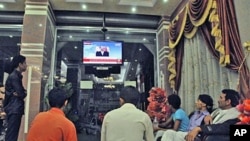An audio recording attributed to Yemen's President Ali Abdullah Saleh has been broadcast on state television, hours after an attack on a mosque in his presidential compound. Yemen state media say the attack killed three guards and an imam.
The voice of what appeared to be a subdued President Saleh was heard thanking his fellow Yemenis for their concern about his condition, which he said was alright.
He also wished a speedy recovery to others injured in the attack, and offered his condolences to the families of those killed. Saleh was wounded in a rocket attack Friday in the presidential mosque in Sana'a during midday prayers. He reportedly is being treated in a military hospital.
The strike, the first on the president's compound, came during fierce street fighting between government troops and tribal forces in the capital and violence in other Yemeni cities, bringing the unrest to the heart of the government.
Shortly after the attack, officials said Saleh would appear at a news conference, an apparent bid to dispel opposition and some media reports that the president had been more seriously injured or possibly killed.
Deputy Information Minister Abduh al-Janadi later went on state TV to explain the delay.
Janadi said Saleh is in good health, and the news conference was postponed because of the "scratches" that the president received. His statement was at odds with comments by a Yemeni diplomat appearing on Arabiya television, who said Saleh was in the front row in the mosque, where the heaviest casualties occurred and might spend four weeks in the hospital. It was not clear from the audio recording which account better reflected the situation.
Officials blamed the attack on forces loyal to the al-Ahmar clan, which have been battling government troops in the capital for nearly two weeks. There has been no official claim of responsibility, though, and the opposition to the president includes government forces who have defected in recent weeks.
Earlier in the day, government troops had fired on houses belonging to members of the al-Ahmar family, as well as an opposition military officer. A government official said he believed the attack on the presidential compound - the first of its kind - was in retaliation.
Forces loyal to tribal leader Sadeq al-Ahmar have been growing in number, with reinforcements trying to enter the city from the north. The sheikh, who heads the Hashid tribal federation, is pushing for Saleh to step down. But the president has three times rejected a regionally-mediated plan that would see a transition of power. Violence also is continuing in Taiz against political protesters, and in Zinjibar against Islamic militants who have seized control of the city.
The various tribal and Islamist forces, as well as high-ranking military defectors, are turning what began four months ago as peaceful political protests into what many observers fear is close to all-out civil war.




